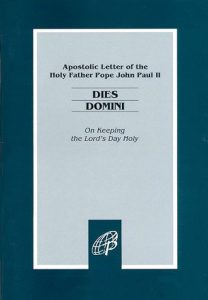In 1998, St. John Paul II wrote this Apostolic Letter Dies Domini, Latin for Day of the Lord, because of the potential problem of the… weekend.
The weekend is a time for rest and family activities, which is good, but it’s mainly about ourselves, whereas, in Christian cultures, the Lord’s Day was primarily about God and worship. John Paul was worried that Christians were getting locked in a horizon so limited that we can no longer see the heavens (4).
We’re either continuing to work on the weekends with a go-go-go mentality, or trying to catch up, or we’re ‘living for the weekend.’ We work and get through the week so that we can enjoy life on Saturday and Sunday, but then we don’t look forward to Monday. Then we repeat the cycle. No clear goal or deep satisfaction—this is not good for the human person.
However, the Lord’s Day is about how we imitate God in His rest, and find deep satisfaction in Him. Jesus says these famous lines in the Gospel: “Come to me, all you that are weary and are carrying heavy burdens, and I will give you rest. Take my yoke upon you, and learn from me; for I am gentle and humble in heart, and you will find rest for your souls. For my yoke is easy, and my burden is light” (Mt 11:28-30). The popular interpretation of these words is that following Jesus made life more comfortable because He got rid of the strictness of the Old Testament. Yet, that can’t be true. His teachings are more demanding: He tells us, for example, not just to get rid of lustful actions, but to get rid of the lust in our hearts.
So, what’s the correct interpretation? Pope Benedict XVI wrote that these words aren’t primarily about what Jesus gives, but about Who He is. Look at four key words, three of which each appear twice: ‘weary,’ ‘burden,’ ‘rest,’ and ‘yoke.’ These words have to do with the Jewish Sabbath day, when people rested from hard work. The Sabbath gave the Jewish people rest, but now Jesus is saying that He will give us rest. Why? Because He is our Sabbath (Jesus of Nazareth, Volume 1, 110; Cf. Dies Domini, 18).
The Jewish people found rest by imitating God, Who, on the seventh day of creation, rested—we do the same, and go ever further. We find rest by living in Christ.
There’s a pastor who said, “By choosing the Sabbath… I’m going to be a son that day… I’m not going to be a ministry leader, I’m not going to be whatever title you have… On the Sabbath day, I am the son. He is the Father, he is the potter, I am the clay… I’m going to get my identity back” (Robert Morris, Take the Day Off, 139). If you know the difference between having fun and being loved, you know what I’m talking about.
During Jesus’ time, the ‘weary’ and those ‘carrying heavy burdens’ were the Jewish people who had to follow the unnecessary laws of the Pharisees, but today, they are the people who forget their deepest identity.
On the Lord’s Day, we rest by connecting with Jesus and our deepest identity: We’re created out of love by our Father in heaven; Jesus died and rose to reconcile us with the Father, and Sunday is the day to recommit ourselves to Him. So, Monday isn’t something to be dreaded, but part of His plan for us to grow in love. Every day makes sense in relation to God’s plan for us.
There is a couple I know that went away for a weekend retreat and, when they came back, one of their resolutions was: Make Sunday different. They don’t accept playdates for their children, no birthday parties, they try to see parents, have an extended brunch after Mass, and no devices (which is hardest but try to). They’re trying to teach the kids the rhythm of rest, and so, their 12-year-old, who is in competitive rock climbing, doesn’t practice with the team on Sunday. In addition, they made a decision to commit to the parish, so, if there’s an event, this is their first spiritual community, and they always go. The parents also bowed out of committees and other events.
The kids are now more in love with other people, and, while some parents have fomo in terms of extracurricular activities on the weekend, this couple is afraid that the kids will miss out on the Lord’s Day. So, this is actually an opportunity! And, in seasons of busyness, the family remembers who they are, their restfulness helps them take on the entire week. Because their Sunday is different, their weekdays are so different.
Here’s the question for all of us: How can we make Sunday different? It’s different than Saturday, right? We said last week that the goal of our Sabbath Summer is to be filled to overflowing with God, and so, when September comes, we’ll want others to have life to the full. To become overflowing, we make Sunday different.
The weekend doesn’t give rest for the soul, but the Lord’s day does.

